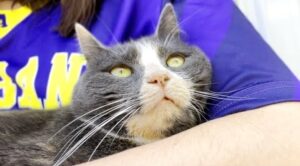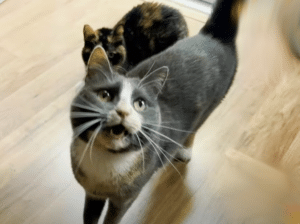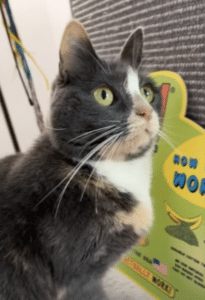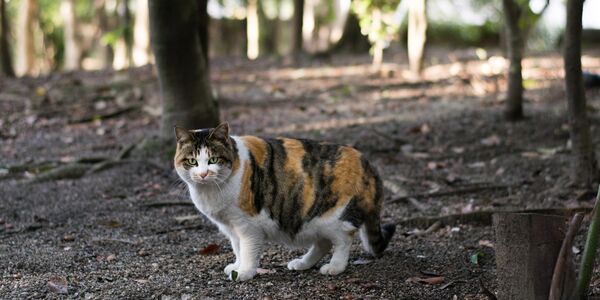Lily, a captivating cat with a unique set of challenges, captures hearts with her mysterious gaze and unpredictable behaviors. Diagnosed with toxoplasmosis, a condition typically contracted through outdoor exposure, Lily’s early life hinted at struggles to come. This parasite, known for its potential to alter neurological functions, left Lily with significant coordination and balance issues, as well as vision abnormalities that distort her perception of distance. Sarah, charmed by Lily’s endearing qualities, adopted her from North Shore Animal League on Long Island.

“I have a soft spot for special needs animals,” Sarah explained to GeoBeats, recalling how she immediately felt a connection with Lily, describing her as “precious.”
Lily’s neurological condition manifests in several peculiar ways. She frequently sees things that aren’t there, startling easily due to her skewed depth perception. “If somebody’s far away, they look close to her,” Sarah noted, describing it as looking “through a magnifying glass.” This aspect of her vision often leads to sudden, seemingly aggressive behaviors, where Lily might hiss or lunge at empty spaces.

Additionally, Lily experiences hyperesthesia episodes, which further complicate her interactions with her environment. These episodes resemble hallucinations, making it appear as if she’s responding to invisible stimuli. This has led many to whimsically suggest that Lily might see ghosts.
Despite these challenges, an MRI showed that Lily’s brain structure appears normal, indicating that the toxoplasmosis has affected her internally without altering her brain’s physical appearance. Managing her condition involves understanding her triggers, particularly new or unfamiliar scents, which can exacerbate her symptoms. Introducing new cats to the household, for instance, requires careful management and medication to ensure her comfort.

Sarah has made significant adjustments to accommodate Lily’s unique needs. “We learned her triggers…we make sure she’s on her medication first,” she shared, highlighting the success they’ve had in managing Lily’s condition.
Lily’s playful nature continues to shine through despite her difficulties with coordination. She often misses when attempting to play with toys, not due to any physical limitation with her limbs, but because her brain does not fully communicate the necessary actions.
Living with Lily, Sarah has embraced the complexities of her condition, finding joy in the special bond they share. Lily’s affection is profoundly meaningful due to her selective nature. “When Lily shows love towards you, it’s really special because she doesn’t do that with everybody,” Sarah reflected.


